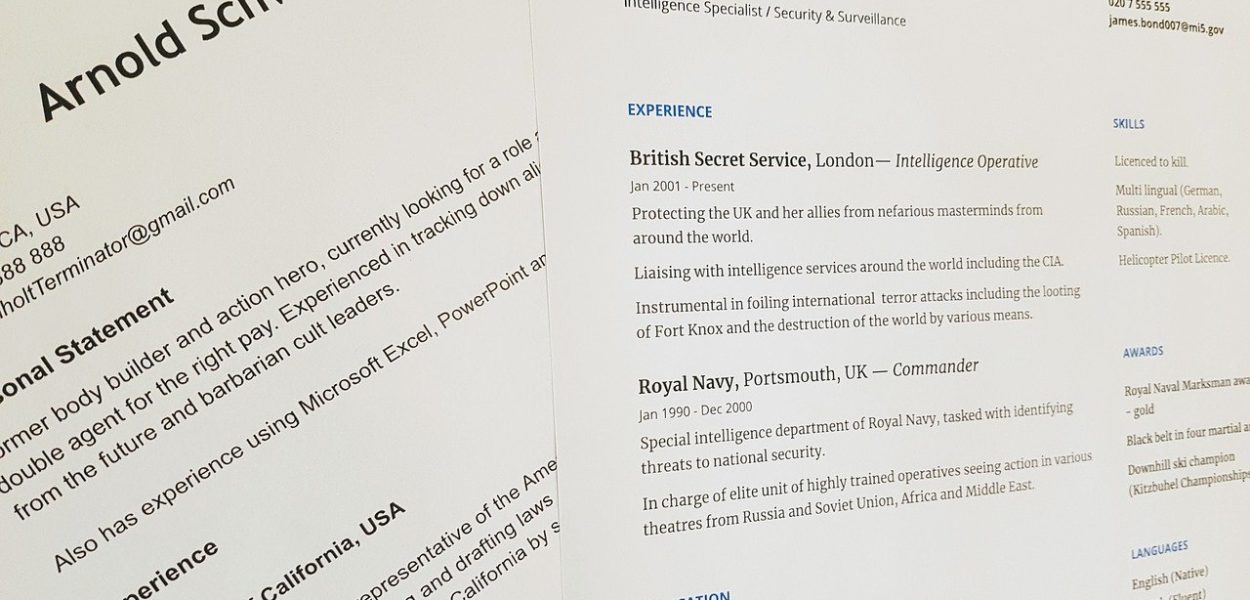Historically, resumes have been a very large part of the hiring process. After all, what could be better to understand a candidate’s experience and capabilities than a chronological account of a job applicant’s work history right there on one (hopefully) or more pages, for hiring firms to review and use as a guide for developing their interviewing questions to delve even deeper.
Yet as much as firms rely on these pieces of paper when hiring a new team member, a resume review is not the most effective way to ensure a good hiring decision. Here are three reasons why resumes can be overrated, and should be utilized only in conjunction with a (more) comprehensive candidate vetting process:
Self Perception Biases - When people have time to prepare a story about themselves, it is (almost) always going to sound better than it really is. Even if the job seeker is not intentionally trying to embellish the facts (though many do), perception almost never matches the reality when humans think about themselves and how they stack up to others. When we review resumes, we see this all of the time - job seekers say they are detailed, organized, punctual, and hardworking, and all of the other buzzwords... which doesn’t tell us anything about whether they are actually a fit for the position or not, and only how they perceive themselves.
Measurability - Even if job seekers list specific measurable accomplishments (which is a good sign) such as sales goals, experience with software programs, problems solved, ideas implemented, etc., it is very difficult to actually verify it. You should approach interviews with the assumption that people always have the best intentions, but sticking to Ronald Reagan’s “trust but verify” approach has kept a lot of employers from making a poor hiring decision. Sometimes you can verify via the references the candidate provides. However, organizations are becoming more tight-lipped about previous worker’s specifics, only sharing generalities, such as position, title, dates employed, etc., to avoid potential lawsuits that might arise from sharing negative feedback about a prior employee (which is unfortunate, because that’s often the exact feedback hiring firms are looking for when calling on references!).
Unreliable Predictability - Past experience doesn’t necessarily predict future success in the role you are hiring for. Every firm is different, and even small nuances can have a substantial impact in terms of job fit. There are lots of variables in each situation, and some people can only continue their success if they all align. And it is not just candidates coming from other firms. We have seen firms who had a great experience with an intern so they promoted them to an Associate Planner, where they ended up struggling because they weren’t able to make the adjustment of not having a set schedule, laid out to-do’s each day, and daily deadlines to meet that they had while a part-time intern.
So if you are prone to be wowed by flashy resumes, design a screening process for each role in your firm where the job seeker can demonstrate if and how they can solve the problems you need solving for your firm to grow.
Here are some ideas for exercises to screen for the skillset for certain types of problems you need to be solved in various positions you may be hiring for:
Financial plans completed quickly and accurately - Provide a case study, and have a fixed time limit to complete it. Make sure the case has some omitted and conflicting data to replicate what clients actually provide. This also gives you great insight into how the applicant deals with uncertainty, asking questions, and making assumptions.
Prioritizing meeting preparation for several new clients - Provide a one-page brief on each client situation, and have applicants rank them in order of who they think will take the most time and should begin work on first.
Develop new client onboarding (or other) process - Have them provide a flowchart, checklist, or some other process they have created in the past (if not proprietary). Have them walk you through the thought process of creating it.
Close warm leads - Have them role-play a mock prospect interview with someone else on your team while you observe. Write out some scripted questions that you know are likely objections for prospective clients to move forward, to see how applicants address them.
Hopefully, these will give you some ideas. And if you don’t have the bandwidth for this, you can check out our candidate screening solution options here. The key is to design an interview process where the applicant has to demonstrate what their experiences have been - not just write and talk about them. So while it may not be time, just yet, to retire resumes for good, consider these suggestions as you conduct your interviews and design your hiring process to reduce the reliance on resumes to make your hiring decisions.
Contact us if you have any questions about how we save you time and hassles when hiring a new planner for your firm.

